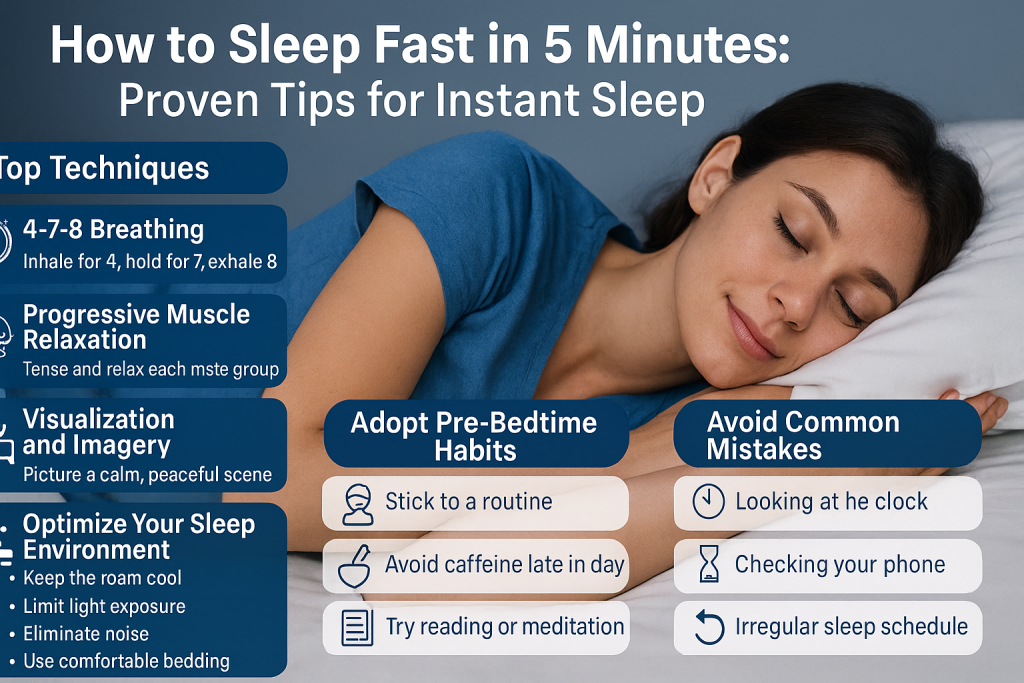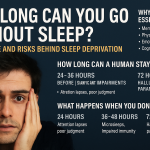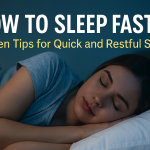Struggling to fall asleep quickly is a common problem affecting millions of people worldwide. Whether it’s stress, anxiety, or an overactive mind, many of us wish we could simply close our eyes and drift off in a matter of minutes. If you’re wondering how to sleep fast in 5 minutes, this comprehensive guide offers practical solutions and scientifically-backed techniques to help you achieve instant rest.
Why Falling Asleep Quickly Matters
Getting enough restful sleep is vital for your mental, physical, and emotional well-being. Sleep deprivation can lead to a myriad of issues including poor concentration, weakened immune function, and even chronic diseases. Learning to fall asleep quickly not only saves time, but also improves sleep quality and enhances overall health.
Understanding the Science of Falling Asleep
Falling asleep is a complex process that involves the relaxation of both body and mind. The parasympathetic nervous system (often known as the “rest and digest” system) must be activated for deep relaxation to occur. Simple techniques focusing on breathing, muscle relaxation, and a peaceful environment can signal your body that it’s time to sleep.
Top Techniques: How to Sleep Fast in 5 Minutes
Several tried-and-tested methods can be used to help you fall asleep in as little as five minutes. Below are the most effective strategies to make sleep come quickly and naturally:
1. The 4-7-8 Breathing Method
This breathing technique, developed by Dr. Andrew Weil, is praised for its ability to calm the nervous system and induce sleep rapidly.
- Inhale quietly through your nose for a count of 4.
- Hold your breath for a count of 7.
- Exhale forcefully through your mouth for a count of 8.
- Repeat the cycle 4 times.
This simple exercise helps slow your heartbeat, decrease anxiety, and prepare your body for restful sleep.
2. Progressive Muscle Relaxation (PMR)
Progressive Muscle Relaxation is a classic technique that involves tensing and then slowly releasing each muscle group in the body. Here’s how to do it:
- Start with your toes and work your way up to your head.
- Tense each muscle group for 5 seconds, then release for 10 seconds.
- Focus on the relaxation and heaviness in your body as you complete the process.
This practice reduces physical tension and signals your mind that it’s time to sleep.
3. Visualization and Guided Imagery
Creating calming mental images can distract your mind from anxious thoughts and help you fall asleep fast. Try this visualization:
- Imagine yourself in a serene place like a beach or a forest.
- Focus on the details – the sound of the waves, the warmth of the sun, or the rustling leaves.
- Allow your mind to wander peacefully as you drift toward sleep.
4. The Military Method
Originally developed for fighter pilots, this technique is said to help anyone fall asleep within 2 minutes, with improvement after consistent practice:
- Relax your face muscles completely, including your jaw and tongue.
- Drop your shoulders, arms, and hands to your sides.
- Exhale and relax your chest, then your legs, thighs, and calves.
- Clear your mind for 10 seconds by picturing a relaxing scene or repeating the phrase “don’t think.”
This method relies on total physical and mental relaxation.
Optimizing Your Sleep Environment for Fast Sleep
Beyond techniques, your environment plays a crucial role in how quickly you can fall asleep. Here’s how to create the ideal sleep setting:
- Keep the Room Cool: The ideal temperature for sleep is around 60–67°F (15–19°C).
- Limit Light Exposure: Use blackout curtains, eye masks, or dim lighting an hour before bedtime.
- Eliminate Noise: Use earplugs or white noise machines to block out disruptive sounds.
- Use Comfortable Bedding: Invest in a quality mattress and pillows.
- Avoid Screens: The blue light from phones and TVs can disrupt your body’s natural melatonin production.
Pre-Bedtime Habits to Help You Fall Asleep Quickly
Your actions in the hours and minutes leading up to bedtime can significantly influence your ability to sleep fast. Adopt these habits for best results:
- Establish a Routine: Try to go to bed and wake up at the same time every day, even on weekends.
- Avoid Stimulants: Refrain from consuming caffeine or nicotine in the late afternoon or evening.
- Limit Heavy Meals: Eat light in the evening, avoiding large or spicy meals close to bedtime.
- Engage in Relaxing Activities: Read a book, meditate, or take a warm bath before bed.
- Exercise Regularly: Physical activity during the day promotes better sleep, but avoid vigorous exercise right before bedtime.
Common Mistakes That Prevent Fast Sleep
Even with the best intentions, certain mistakes can sabotage your effort to fall asleep quickly. Be mindful to avoid these:
- Looking at the Clock: Watching the minutes tick by increases anxiety and makes sleep more elusive.
- Checking Your Phone: Notifications and scrolling can stimulate your mind instead of calming it.
- Overthinking: Mental to-do lists or worrying thoughts keep your brain active when it needs to wind down.
- Irregular Sleep Schedule: Inconsistent sleep and wake times disrupt your body’s internal clock.
When to Seek Professional Help
If you consistently struggle to fall asleep or suffer from chronic insomnia, it may be time to consult a healthcare provider or sleep specialist. Sleep disorders can be serious, and professional advice is invaluable if self-help measures aren’t effective.
Conclusion: Your Roadmap to Falling Asleep in 5 Minutes
Mastering how to sleep fast in 5 minutes is achievable with practice and the right techniques. From controlled breathing to muscle relaxation, visualization, and optimizing your sleep environment, these strategies can help you reclaim restful nights and energetic mornings. Remember, consistency is key, and making small adjustments to your nightly routine can lead to big improvements in your sleep quality.
Quick Summary Checklist
- Try the 4-7-8 breathing or the military method
- Relax your body progressively
- Visualize calming scenes
- Optimize bedroom environment (cool, dark, quiet)
- Avoid screens, heavy meals, and caffeine before bed
With regular practice and mindfulness, falling asleep in 5 minutes can become your new normal.


